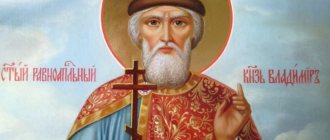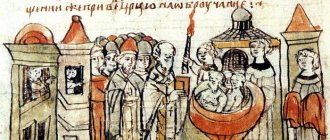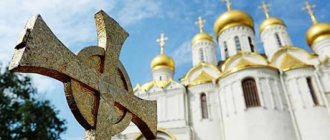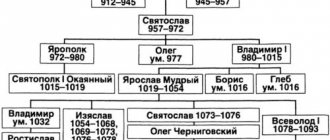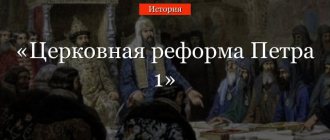Christianity before baptism
Today, in addition to the main version of the adoption of Christianity in Rus' - from Vladimir - there are a number of others: from the Apostle Andrew the First-Called; from Cyril and Methodius; from Askold and Dir; from Patriarch Photius of Constantinople; from Princess Olga. Some of the versions will remain hypotheses, but others have the right to life. In the past, Russian church historical literature traced the history of Christianity in Rus' from the 1st century, linking it with the missionary activities of the Apostle Andrew the First-Called. This version was voiced by Ivan the Terrible in a conversation with the papal legate Antonio Possevino: “We received faith at the beginning of the Christian church, when Andrei, brother of the ap. Peter, came to these countries to go to Rome." The event that took place in Kyiv in 988 was called “the conversion of Prince Vladimir,” or “the final establishment of the Orthodox Church in Russia under St. Vladimir.” We know about the journey of the Apostle Andrew the First-Called along the path “from the Varangians to the Greeks,” during which the preacher visited the Dnieper region and Ladoga, from the “Tale of Bygone Years.” However, already Nikolai Karamzin in his “History of the Russian State” noted: “however, people who know doubt the truth of this Andreev’s journey.”
The historian of the Russian Church Evgeniy Golubinsky noted the illogicality of such a journey: “Going from Korsun (Chersonese Tauride) to Rome through the Kyiv and Novgorod lands is the same as getting from Moscow to St. Petersburg through Odessa.” Based on the works of Byzantine chroniclers and the early Fathers of the Church, we can only say with confidence that Andrew the First-Called reached the lands of modern Crimea and Abkhazia. The missionary activity of the Apostle Andrew can hardly be called the “Baptism of Rus'”; these are only the first attempts to introduce the peoples of the Northern Black Sea region to the emerging religion. The intention of researchers to attribute the date of adoption of Christianity in Rus' to the second half of the 9th century deserves more attention. There are reasons for this. Some historians are alarmed by the fact that the official baptism of Rus', which took place in 988, is ignored by the Byzantine chronicles of that time. Church historian Vladislav Petrushko wrote: “Strikingly, Greek authors do not even mention such an epoch-making event as the baptism of Rus' under St. Vladimir. However, the Greeks had their own reasons: the diocese of “Russia” was formally opened a century earlier.” In 867, a “district message” of the Patriarch Photius of Constantinople was recorded, which mentions “the Rus who enslaved neighboring peoples,” who “raised their hand against the Roman Empire. But now they too have changed the Hellenic and godless faith, in which they were previously held, to pure Christian teaching.” “And such a thirst for faith and zeal was kindled in them,” continues Photius, “that they accepted a shepherd and perform Christian rites with great care.”
Historians tend to compare Photius's message with the Russian campaign against Constantinople in 860 (according to the chronicle dating - in 866). The Byzantine emperor Constantine Porphyrogenitus, who lived after Photius, also reports the baptism of the Rus, but under the patriarchate not of Photius, but of Ignatius, who headed the Byzantine church twice - in 847–858 and in 867–877. Perhaps this contradiction could have been ignored if not for one document. We are talking about the agreement between the Kyiv prince Oleg and the Greeks, concluded in 911 - a monument whose authenticity today is beyond doubt. In this treaty, the words “Rusyns” and “Christians” are clearly opposed to each other. The final words of the chronicler about Oleg’s campaign against Constantinople are eloquent: “And Oleg came to Kyiv, carrying gold, and grass, and wine, and all sorts of ornaments. And the one who called Oleg is prophetic, because people are trash and ignorant.” It is quite obvious that in the mouth of the chronicler, “people of trash and neveiglas” are pagans. The authenticity of evidence of the adoption of Christianity by the Rus in the 9th century is generally not disputed by historians. However, as one of the leading experts on the history of Ancient Rus', Igor Froyanov, said, “the most that can be extracted from this evidence is the assumption of single trips of missionaries to the borders of Scythia, immersed in paganism.”
Consequences of the adoption of Christianity in Rus':
- The power of the Kyiv princes increased significantly. The Church demanded unquestioning submission to authority.
- There was a consolidation of the East Slavic tribes into a single ancient Russian nation.
- The international position of Rus' has strengthened
- The church became a significant force in the state, which contributed to the strengthening of the grand ducal power and the unification of the people.
- Christianity contributed to the further development of culture, the spread of Byzantine painting, literature, writing, and architecture. Schools were created at the monasteries, literacy was spread, and handwritten books were created.
- Morals have softened. Sacrifice and ritual killings are a thing of the past. For the first time, the concept of sinfulness appeared in society, which did not exist in paganism.
- Strengthening the family and moral foundations of life.
- Christian commandments changed moral standards and were a powerful educational tool.
Material prepared by: Melnikova Vera Aleksandrovna.
Free templates for Joomla on web-design.ru.
The first Christians
After Oleg’s political and trade treaties with Constantinople, Russian-Byzantine ties began to strengthen. Byzantine merchants actively flocked to the Slavic lands, and missionaries became frequent guests in the Black Sea region and on the banks of the Dnieper. Although the baptism of Russians was not widespread, it is likely that by the middle of the 10th century a Christian community already existed in Kyiv. The penetration of Christianity into Kievan Rus is evidenced by the mention of the cathedral church of Elijah the Prophet in Kyiv in the Russian-Byzantine treaty of 944.
Among those who were baptized was the Kiev princess Olga. This event became significant, since Olga became the first ruler in the history of the Old Russian state to break with paganism. “For the next generation, the example of an energetic, intelligent princess broke the ice of coldness and prejudice against Christianity, which now no longer seemed so alien, unusual and inappropriate for Rus',” wrote historian Vladimir Parkhomenko. The date and circumstances of Olga’s baptism are not entirely clear. The author of The Tale of Bygone Years connects this event with the princess’s trip to Constantinople. The chronicler’s narrative is in some places full of fabulous details, but the very fact of baptism does not raise doubts among historians, as it is confirmed by many Byzantine sources. Based on these documents, Olga's baptism is dated to 957. Olga’s (baptized Elena) adoption of Christianity was rather of a private nature and did not in any way affect either her associates or her son Svyatoslav. “How do I want to accept the same law? And the squad will start laughing at this,” Svyatoslav answered his mother to her calls to be baptized. In the 971 agreement between Prince Svyatoslav and the Byzantine Emperor Tzimiskes, we still see Rus', which swears by Perun and Volos. The new faith primarily affected the trading people who often visited Constantinople, since the adoption of Christianity provided them with much more favorable conditions in Byzantium. In addition to the merchants, Russian warriors who were in the service of the Byzantine emperor also willingly embraced Christianity. It is these “Christian Rus” who, upon returning home, replenished the Christian community that Konstantin Porphyrogenitus mentions.
Reasons for accepting Christianity:
- Strengthening the state. Faith in one God could unite the people
- Strengthen the power of the Kyiv princes, giving it divine power
- Vladimir was close to Christianity, with its idea of forgiveness of sins. Repentance, righteous life (perhaps he was burdened by the murder of his brother Yaropolk during the struggle for the throne, riotous lifestyle, spiritual emptiness).
- Olga’s adoption of Christianity; in addition, there were already many Christians in Rus' who supported the prince.
- Strengthening the foreign policy position of Rus'. The pagan state was perceived by states as an unequal partner.
Choosing Faith
Meanwhile, Ancient Rus' was getting closer and closer to the moment when a single faith was supposed to subjugate scattered tribes to princely power. Historian Boris Grekov noted the attempts of Vladimir Svyatoslavich, with the help of a pantheon of various pagan gods, to create a religion “that could more firmly unite his entire state.” Obsolete paganism turned out to be a bad unifying principle and could not prevent the collapse of the huge tribal union led by Kiev. Apparently, it was then that Vladimir turned his attention to monotheistic religions. Vladimir’s choice of religion is often associated with a legendary story called “the test of faith.” The Kiev prince, having listened to the sermons of representatives of Roman Catholicism, Bulgar Mohammedanism, Khazar Judaism and Greek Orthodoxy, sent his ambassadors to these countries to become closely acquainted with the liturgical rites.
The chronicler reports that the envoys who returned from Constantinople with the words “They did not know where we were - in heaven or on earth” made the strongest impression on Vladimir. This predetermined the choice of faith according to the Greek rite. Many historians, although they are skeptical about the story about the “test of faith”, endowing it with a bookish, instructive character, still recognize that it could be based on real events. A well-known expert on Ancient Rus', Vladimir Mavrodin, believes that in this story one can see “snippets of memories of real historical events that clearly reflect Rus' at a crossroads.” In particular, the authenticity of such events can be evidenced by the message of the 13th century Arab writer Muhammad al-Aufi “about the embassy of Bulamir (Vladimir) to Khorezm for the purpose of “testing” Islam and about the embassy of a Muslim imam to Rus' to convert Russians to the Mohammedan faith.”
One way or another, the decision to baptize Rus' was not based solely on the opinion of the embassy. The adoption of a single religion for Vladimir was determined primarily by political motives and the difficult situation not only within the state, but also on its outskirts. At that time, the southern borders of Rus' were constantly attacked by nomads who burned fields, ravaged villages and besieged them for years. Under these conditions, Vladimir counted on friendly and allied relations with Byzantium, which could only take place after the Old Russian state adopted Christianity. The historian Mikhail Pokrovsky attributed an important role in the baptism of Rus' to the upper layer of ancient Russian society - the princes and boyars, who “disdained the old Slavic religious rites and Slavic sorcerers, “magi”, and began to write out for themselves, along with Greek silk fabrics and gold jewelry, Greek rites, and the Greek “magi” - priests.”
An expert on ancient Russian history, Sergei Bakhrushin, places slightly different emphasis, noting that in the 10th century a layer of feudal nobility was formed in Rus', which “was in a hurry to sanctify its claims to a dominant position.” Today it is not known for certain where Vladimir was baptized. The traditional version, according to which the Kiev prince was baptized in Chersonese, is rejected, in particular, by academician Alexei Shakhmatov, who believes that the news of the Korsun campaign of Prince Vladimir is “a later insertion that tore apart the original chronicle text.” There is no exact data about the baptism of Kyiv residents: some researchers believe that mass baptism took place in the Dnieper, others call Pochaina. According to modern historians, the year 988 can be considered only a conditional date for the baptism of the entire Old Russian state. Russian religious scholar Nikolai Gordienko connects this event exclusively with the “conversion of the people of Kiev to Christianity,” which became only one of the initial moments of a long-term, often painful process of introducing the inhabitants of the entire Old Russian state to the new faith.
Prerequisites for the emergence of a new faith on Russian lands
Prince Vladimir understood that with the scattered pagan tribes of the Slavs, a strong power could not be built . He chose a single religion , which was supposed to cement the union of the Eastern Slavs with a common idea. He doubted for a long time which religion to choose. The chronicles say that representatives of the most powerful religions at that time came to the Russian prince to persuade him to their faith.
Embassies from Muslims from Volga Bulgaria, from Khazar Jews, representatives of the Roman Church and envoys from Byzantium arrived in Kyiv. The prince also sent his ambassadors to see the rituals of religions with their own eyes and see how each religion affected the lives of the local population. After the return of their ambassadors and after a long council of the boyars, it was decided to accept Christianity of the Byzantine rite.
III. Baptism of Novgorod. — Novgorod under the rule of Kyiv. — Return of its independence
The Russian Land received St. baptism. From Kyiv, Christianity spread across the Slavic lands of the Russian Union. It also appeared in Novgorod. The Nikon list of the Sylvester Chronicle briefly tells that in 990 Mikhail himself, the first Russian metropolitan, arrived in Novgorod with the bishops given to him among six from the patriarch, with Dobrynya, Volodymyr’s uncle, and with Anastas, the Greek, the traitor of Korsun.
Walking through the lands, they crushed idols, baptized many people, erected churches, and installed priests in cities and villages. The chronicle says nothing about resistance on the part of the pagans. “There was,” she says, “great silence everywhere.” But, as you can see, this was only the first planting of Christianity and it was received rather poorly. Paganism was too strong in the north; the adoption of Christianity was not prepared by the preliminary free spread of the new faith, as was the case in Kyiv during its long-term relations with Greece.
In 992, under Michael’s successor, Metropolitan Leontius, Bishop John, appointed to Novgorod, having arrived there, had to once again crush idols and destroy the temples. There is a story about this second sermon of Christianity in Novgorod preserved in the so-called Joachim Chronicle, very plausible and probably based on centuries-old local traditions, like much in this narrative passage, which does not deprive it of historical significance, despite the fact that there are quite a few distortions in it . In general, according to the news of this chronicle, the baptism of the Russian world at that time did not take place as voluntarily and tenderly as can be concluded from the stories of the Sylvester Chronicle. Along with the peaceful shepherds-teachers of the verbal flock, preachers of a different kind walked: Dobrynya, Uncle Volodimirov, and Putyata, Volodimirov of the thousand, and with them there was a military force. Where pastoral exhortations did not prevail, more carnal means were used. In this way they baptized people in different lands of the Slavic-Russian world, sometimes in hundreds, sometimes in thousands - depending on where it happened. The unfaithful people grieved and grumbled, but there was nothing to do: they did not dare to resist the military force. Initially, the army of preachers was, of course, from Kyiv, but then in each land newly baptized people were recruited into it, and thus the strength increased. Having acquired new Christians through fear in one place, the apostles used them to obtain weapons for fear in other places. Then it was easy to arouse warlike passions and recruit others who wanted to fight: others could be baptized only in order to be taken into the army; It was easy to take advantage of the old rivalries and prejudices that prevailed between one and other lands and places: there were probably those who rejoiced at the opportunity to recall the old days to their neighbors; finally, daring ambition was easily tickled and generally aroused by the desire to make others feel their strength and to force others to do things in their own way, and not in theirs. So, Dobrynya and Putyata, who were with the bishops in Rostov, recruited newly baptized Rostovites into their army and went to Novgorod. While the army, passing from Kyiv through various lands, finally reached distant Novgorod, it, of course, strengthened to the highest degree, and Novgorod was destined to receive more guests than other lands. Before that, the pagan Novgorodians also showed tolerance towards Christians; at least there was a Christian Church of the Transfiguration in Novgorod, built, probably, in the parish of Metropolitan Michael; their compatriots who had recently received baptism lived peacefully among the pagans. But when the pagans heard that a military force was coming to them in order to destroy the gods - their great-grandfather’s shrine, they formed a veche and sentenced not to let those coming into the city and not to hand over the gods. The left side of the city along the Volkhov River held on more stubbornly than the old faith, and was also strengthened. The preachers with the army first came to the right (Trading) side and saw that the bridge had been dismantled and stone-throwing weapons, called vices, were set up against them on the bank: a cloud of stones threatened them as soon as they attempted to forcefully cross to the other side. They began to baptize people on the right side, and within two days they baptized several hundred of them, but they generally noticed that the word of the cross seemed to be an incorrect madness and deception.
On the left side, the senior priest Bohumil, nicknamed “Nightingale” for his sweet speech, excited the people to stand for the faith of their ancestors. The Thousand Stolen drove around the city and shouted: “It’s better for us to die than to be given to the reproach of our gods.” Then the thousand Volodimirov, Putyata, a brave and intelligent man, crossed at night with five hundred Rostovites to the other side. The Novgorodians mistakenly mistook them for their own and let them into the city. The Rostovites seized Ugony in his yard, and seized several other similar horse breeders (front husbands). Putyata immediately sent them to the right bank to Dobrynya. This spread throughout the city. The people became furious and then a frantic hatred of Christianity was aroused in them; they swept away the Church of the Transfiguration, robbed and destroyed the houses of Christians. Then, probably, they killed Dobrynya’s wife, destroyed his house, and killed some of his relatives; although the Joachim Chronicle speaks about this before the crossing of Putyata to the left bank, but since the destruction of the church and Christian houses followed as a consequence of popular irritation aroused by this night crossing and the attack on Ugony, then, probably, the act with the family did not Dobrynya's house was supposed to happen during these hours of general popular unrest. It is strange, however, that Dobrynya, knowing well the spirit of Novgorod, left his wife and relatives in Novgorod when he was planning to go there and when he expected that he might be met as an enemy: in this case, he would have ordered in advance to remove them to a safer place. At the same time, up to five thousand Novgorodians entered into a brutal battle with Putyata and the Rostovites; then Dobrynya, taking advantage of the darkness of the night, crossed to the other bank and set fire to the houses on the shore. There was general confusion, many rushed to put out the fire; (noble people, boyars, sent to Dobrynya to ask for peace. Dobrynya ordered to save the city himself and stop plundering. Reprisals were given to the gods: wooden idols were burned, stone ones were thrown into the river. Men and women, old and the little ones, screaming and crying, begged to spare the gods and not to mock them. Why do you, crazy people, feel sorry for them, - Dobrynya told them: - what kind of gods are these, that they don’t know how to defend themselves! What good can you expect from them! " Of course, the defenselessness of the gods should have had an impact on the masses, as always happened in such cases, when the people, seeing the powerlessness of their idols, began to doubt them, but, according to the narrator, the Novgorodians still did not want to be baptized. It is clear that violence was supposed to offend the free spirit of the Ilmen Slavs, although struck more than once, was not yet broken and not strangled either by long-term oppression or alien moral influence. Novgorodians went into the water only out of extreme captivity; those who did not want to were dragged by soldiers to the Volkhov: men were baptized above, and women below the bridge ; and many, in order to remain unbaptized, resorted to cunning and assured that they had already been baptized. Therefore, preachers put crosses on the necks of all those baptized. The Novgorodians obeyed - there was nowhere to go; They washed themselves in water, put on crosses, but in their souls for a long time they remained at least not Christians, if not completely pagans. In memory of the forced baptism, after that, they reproached the Novgorodians for a long time, and told them with ridicule: “Putyata baptized you with a sword, and Dobrynya with fire.”
About Perun, the main idol, such a legend was preserved in subsequent centuries. When he was thrown from the bridge, a demon entered into him and the idol began to shout: “Oh, woe, oh, me! I fell into unmerciful hands.” Swimming under the big bridge, he threw a stick onto the bridge and said: remember me with this, children of Novgorod! It was forbidden to adopt it. The unfortunate god sailed to the shore near Pidba (at the mouth of the Pidba River, which flows into the Volkhov on the left side, below Novgorod). Pidbyanin went out to the river, planning to take a boat to the city to carry pots for sale: he saw Perun, hit him with a pole and said: “You have had enough, Perunishche, you have eaten and drunk, now swim away.”
The legend about the forced baptism of Novgorod, according to the Joachim Chronicle, confirms that during this period of time Novgorod was a conquered land under such
Conditions that did not allow the Novgorodians to show their originality. Voluntarily chosen by the Novgorodians, Vladimir conquered it with the help of the Norman Varangians, and then, having become the prince of Kiev, maintained his power over him: thus Novgorod, through him, fell under the rule of Kyiv, becoming, as it were, a suburb of the latter. When the Pechenegs began to heavily attack the Kyiv Land, Vladimir in 997 went to Novgorod to recruit soldiers (according to the supreme military). Novgorodians had to shed blood far from their homeland in defense of a distant land. The Novgorodians were obliged to pay the Kyiv prince two thousand hryvnias a year, and another thousand hryvnias were given for the princely fees, that is, for the garrison that kept the city in obedience. The son of the Kyiv prince, Yaroslav, was entrusted with management. But, treating Novgorod as a conquered region, the Kiev prince did not destroy the internal self-government of the city, because in Novgorod there were posadniks who collected tribute and gave it to the prince placed over them. It is not known in what conditions the power of the prince was then in relation to the rights of the mayor; judging by the above news, the latter served as a kind of mediator between the power of the princes and the people. It is not without reason that the Scandinavian sagas describe Yaroslav as covetous and stingy. Collecting lessons from Novgorod, he did not send them to his father, and the old man had to prepare for a campaign against his son in order to keep the Novgorod region dependent on Kyiv. But as soon as Yaroslav heard that his father wanted to go against him, he fled to the Varangians overseas, just as his father did when his brother Yaropolk threatened him. The cause of Yaroslav's uprising against his father was not at all a popular Novgorod affair: it was no easier for Novgorod because Yaroslav did not pay his father, but kept for himself what he collected from the Novgorodians. The Novgorodians, apparently, did not give him help for his father; that is why he fled overseas. The Varangians, who later arrived with him from across the sea to Novgorod, treated the residents arbitrarily and raped the Novgorod wives. Foreign violence brought the Novgorodians out of patience: until now, their enslavement was limited to the payment of tribute to the prince; Now the foreigners brought by the prince encroached on their home rights: a conspiracy was formed and the Varangians were killed. The chronicler accurately points to the very place where this murder took place - in the courtyard of Poromoni; Poromonya was probably one of the instigators of the conspiracy. Yaroslav went outside the city to Rakom (on the right bank of the Ilmen) and sent to the Novgorodians to say: “I can no longer resurrect the beaten.” He invited the instigators to his place, probably for peace. Deceived by his words, they appeared and were all hacked to pieces. But that same night news came that Svyatopolk had killed the brothers. Then Yaroslav himself appeared at the meeting in the field and asked for forgiveness from the Novgorodians. The Novgorodians answered: “If, prince, our brothers are cut down, then we can stand up for you!” Soloviev rightly explains the consent of the Novgorodians by the fact that, probably, Yaroslav managed to combine his cause with the cause of Novgorod and provided the Novgorodians with the opportunity to free themselves from the tribute they paid to the Kyiv prince. Svyatopolk, having captured Kiev, already had a claim to Novgorod for that very reason: under Vladimir, Novgorod was subordinate to Kyiv - this should have remained so under Svyatopolk, who became Vladimir’s successor. Novgorod, taking the side of Yaroslav, if successful, could regain full independence. The chronicler says that Yaroslav gathered one thousand Varangians and forty thousand others.
As for the Varangians, the Novgorodians probably killed only those of them whom they considered especially guilty; and indeed, they could not kill the entire Varangian detachment when this beating took place in one private courtyard, where only a limited number could fit. Regarding the number of others
40,000 can hardly be accepted in the very form in which it is shown in the chronicle: it will be enough if we conclude from it that the number of Novgorodians who entered the ranks of Yaroslav was large.
Be that as it may, the Novgorodians zealously took the side of Yaroslav because they saw the possibility of their liberation from Kyiv and with the help of their militia, Yaroslav won the war. It is remarkable that during this war the claim not of the prince, but of the people of Kiev, to power over the Novgorodians was manifested. When it came to battle, the Kievans who were with Svyatopolk bullied the Novgorodians, called them carpenters and threatened to turn them into building their own mansion. The Kievans looked at the Novgorodians as their servants, and not just as tributaries of their prince: and you are real carpenters!
and let’s set up a mansion of ours to chop! These carpenters, these subjects of Kyiv, in turn, became masters. Svyatopolk was defeated; Kyiv is conquered. Yaroslav distributed 10 hryvnias each to all Novgorodians: this was the right of the victors, the right of the conquerors.
The winner did not sit quietly in Kyiv for long. Svyatopolk brought Boleslav. A new battle took place - the battle with the Poles in 1018, on the banks of the Bug. Yaroslav had besides Rus', i.e. Polans, hired Varangians and Slovenians, i.e. Novgorodians, those who probably remained to serve with him in the south. Yaroslav was brutally defeated, and with only four husbands he fled to Novgorod. He did not hope to hold out there either and wanted to flee overseas, but then the Novgorodians, under the leadership of Kosnyatin, Dobrynin’s son (although not a Novgorodian by ancestry, but who lived with Novgorod and probably saw the light there), stopped Yaroslav, burned the prepared boats and seized willingness to help Yaroslav themselves. They contributed 10 hryvnia from the elders, 18 hryvnia from the boyars, and 4 kuna from the husband [12]. However, the strength of the Novgorodians was not as important as their readiness. Having looked around, they saw that they had to invite mercenaries - and they went overseas for the Varangians. It was natural: the last defeat should have weakened the Novgorod military force, and the previous victory was not in vain. The Novgorodians were put in such a position that they had to pull with all their might to help their prince. Svyatopolk's victory threatened them with complete enslavement. Now the Grand Duke of Kiev would not be content with the return of his former citizenship: now revenge for the previous defeat would be added; the case of Svyatopolk was already before that the case of Kyiv: now the offended pride of the people of Kiev would subject the liberated subjects to the same captivity that always awaits unsuccessfully indignant slaves. The Novgorodians had to stand unitedly for Yaroslav in order to save themselves. The victory at the Alta River in 1019 established the freedom of Novgorod forever. The Novgorodians another time and forever brought Yaroslav the great reign in Kyiv. From then on, the dependence on Kyiv, which arose during the reign of Vladimir, supported by the prince’s connection with the Scandinavian sovereigns, ceased. According to the Sophia Vremnik, Yaroslav, having awarded the Novgorodians with money in the same amount as, according to the Novgorod Chronicle, Yaroslav presented to the Novgorodians after his first victory over Svyatopolk, gave them “Pravda” and “Charter” - a charter [13].
Notes:
1
“Their sons and grandsons of the prince are each by their knees and climb. for himself eternal glory and wealth with his sword and bow, possessing both the northern countries and throughout the sea, even to the limit of the Arctic Sea and around the yellow and green waters and along the great rivers Pechera and Vy and beyond the impassable high mountains in the country called Skir along the great river Ob to the mouth of the Belovodnaya River, where the water is as white as milk: there the animals will be born recommended sable. I also went to the Egyptian countries, fought with a lot of courage, showing in the Elinsky and Zarvarsky countries: then there was great fear from them.”
12
Here, probably, the husband did not mean a princely warrior, for it is impossible for someone close to the prince to pay so little in comparison with the boyars, when it was very natural that the princely squad included boyars, i.e. noble and rich people.
13
Soph. Bp., I, 134. Having copied the letter, he said: according to this, walk and carry it, just as I copied it for you.
Table of contents
